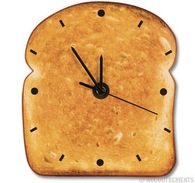 We’ve all heard the phrase ‘you are what you eat’, but what about when you eat? There is a lot of interesting research that suggests when we eat and how organized we are with our meal schedules can affect our weight. Let’s start with some research you’ve probably heard of: breakfast. It’s the most important meal of the day many claim, one which helps students perform better in school. Research also shows that skipping breakfast is associated with increased prevalence of obesity. The thought is that skipping breakfast increases hunger throughout the day, making us overeat at our next meal. Data also suggests that eating breakfast helps minimize impulsive snacking. Not everyone is convinced that this is the case, however. Of course what we are eating for breakfast is a more critical factor. For example, a veggie egg scramble on whole wheat toast vs. a grande mocha and maple nut scone from Starbucks, (containing a 770 calories and 59 grams of sugar - almost 15 teaspoons! - together). What about meal frequency? Is it better to eat frequent, small meals or eat three square meals a day? The jury is still out, but compelling evidence does show that eating multiple, small meals can suppress hunger and overall serum insulin concentrations. This is important news as high insulin levels are associated with obesity and cancer. One other interesting finding regarding the when is in those of us who eat late at night. Data suggest that the consumption of carbohydrate-rich foods in the late evening increases glycogen levels in our muscles. Unless this stored glycogen is burned as fuel, it will ultimately be stored as fat. Therefore, consumption of late-evening meals with carbohydrate-rich foods may also be related to obesity. In addition, eating late at night also affects the circadian rhythms of the hormones leptin and ghrelin, which affect hunger and satiation (or fullness). Leptin signals satiation thereby decreasing food intake while ghrelin induces hunger, affecting meal initiation. Eating late at night (as well as being sleep deprived) turns leptin down and raises ghrelin up, a bad combination for those trying to manage their weight. So…perhaps the when isn't the entire story, but being conscious of it can be a powerful tool for weight maintenance. Don’t skip breakfast or other meals and try to eat every 2-4 hours. Take inventory of your eating and sleep habits and focus on meals that keep your blood sugar in balance (and don't forget the power of Sugar Blockers!)
2 Comments
Fine dining is not something that I can count on. I really do feel like people are not aware of what it is that we need to do in order to eat at such a luxurious place. I am not really saying that we shouldn't, but do we have to? In my opinion, it is better to just go and eat as much as you can for as cheap as you can. This is my personal mantra in life.
Reply
Leave a Reply. |
AuthorHello and welcome! My name is Andrea Notch Mayzeles. I am a Certified Health Education Specialist, Mom, and Master of Public Health dedicated to the path of well-being. As a wellness professional I am committed to continued learning and am here to share research, recipes and musings on health, psychology, personal development, and parenting. I hope you enjoy! Categories
All
|

 RSS Feed
RSS Feed